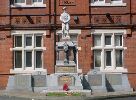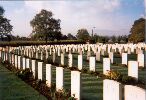
Newton-le-Willows and
Earlestown War Memorial

| OTHER WARS |
 |
Newton-le-Willows andEarlestown War Memorial |
 |
| The
Great War Roll of Honour |
|||||||||||||||||||||||||

Alan Hawkins, whilst researching his family history, found the following information about Private Peter Maines.
"Peter's parents were William Maines and Elizabeth Eleanor
Lomas, married at Earlestown Parish Church on 16/06/1880. Peter was born in
1896, at which time his father was a blacksmith's striker and the family lived
at 89 Regent Street, Newton-in-Makerfield. Peter enlisted at Warrington as
no.12309 in the 6th Battalion South Lancashire Regiment on 01/09/1914. The
family were then living at 29 Nelson Street, Earlestown, and Peter was a wagon
maker. His physical description gave a height of five feet six and a half
inches, he had brown hair and hazel eyes.
"His battalion embarked for Gallipoli from Avonmouth on the SS Ausonia
on 13/06/1915, eventually landing at 'W'
Beach, Helles in July after time spent at Mudros.
Peter's service record from WO363
shows he received a gun shot wound to the left thigh on 18/08/1915, was hospitalised,
and rejoined the battalion base at Alexandria at the end of September. The
war diary WO95/4302 shows that on 16/08/1915 the battalion had taken over
partially dug firing line trenches in the Aghyl Dere sector, running from
Stafford Gully to Farm Gully, and were working to improve them at the time
Peter would have been wounded. The battalion embarked from Port Said in February
1916, arriving in Basra in early March to take part in the Mesopotamia campaign.
"Private Peter Maines was reported killed in action on 19/04/1916. The
battalion war diary WO95/5156 indicates this was during the Falahiyan Action,
and on that day the battalion were holding a section of a flooded communications
trench, at Twin Pimples, under heavy bombardment. SDGW shows that seventeen
other soldiers from the battalion were also killed in action on 19/04/1916.
A search on CWGC shows that sadly none has a known grave, and they are commemorated
together on Panel 23 of the Basra
War Memorial. Army form W5080, recording relatives of the deceased and
returned by his mother Eleanor on 18/09/1919, shows his parents still living
at 29 Nelson Street, with children Robert 27, Annie 31, Nellie 19, Martha
16 and Ethel 14."
Peter's obituary in the Newton and Earlestown Guardian of May 19th 1916 adds little other than that he was an old District School scholar, had worked in the wagon shop at the Vulcan Works, and had "enlisted when Kitchener's first call for men went forth."
Peter was killed on the same day as George Garrity, and ten days after Charles Zorn. Whalley-Kelly continues the account of the fighting in Mesopotamia quoted in Charles's profile as follows:
"On 13th April the 38th Brigade was moved to the opposite and right bank of the Tigris. The Battalion was in reserve to the 3rd (Indian) Division in the vicinity of the Abu Rumman mounds until the 17th, when it was employed in clearing up the situation in the Bait Isa area, where the Turks had delivered a counter-attack in force. This task involved three days' fighting with bombs and bayonets under trench-warfare conditions, and the Battalion was successful in driving the enemy out of the localities allotted to it before being relieved on the 20th for a well-earned rest. Unfortunately all its sacrifices were in vain, as Kut fell on 29th April, and General Townshend with his wasted but gallant garrison marched captive into the interior of Anatolia."